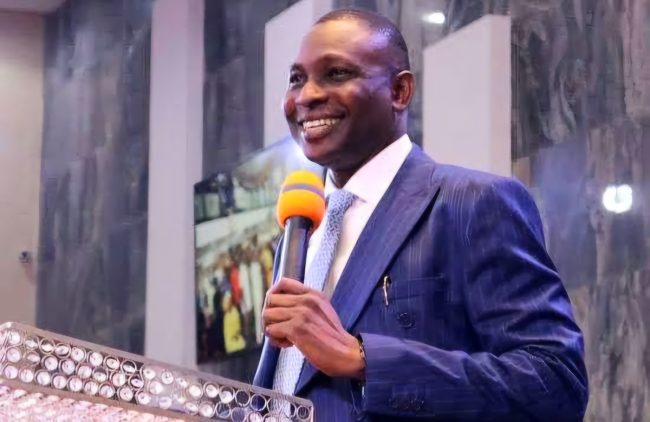
By TONY EGBULEFU
Last year, the Economic and Financial Crimes Commission broke every record it set in asset forfeiture, prosecution, and conviction in its 22 years of existence. Leading up to this were institutional innovations and strides, which the EFCC Executive Chairman, Mr Ola Olukoyede, took to a whole new height in his one and a half years of exemplary leadership of the commission.
The record-setting 4,111 convictions the EFCC had in 2024 followed a record-breaking 12,928 investigated cases, of which 5,083 were filed in courts.
Some arrests and forfeitures were not just jaw-droppers; they set specific records.
On Tuesday, December 10, 2024, operatives of the Lagos Zonal Directorate of the commission rounded up a syndicate of 792 suspected cryptocurrency investment and romance fraudsters in Lagos. The haul was made in an imposing seven-storey building branded “Big Leaf Building” on 7 Oyin Jolayemi Street, Victoria Island, Lagos. Of this number, 194 were nationals of China, Tunisia, the Philippines, Kharzartan and Pakistan, who turned out to be the ring leaders and masterminds. The “Big Leaf Building”, which could easily be mistaken for the corporate headquarters of a financial establishment, was a cybercrime academy where the foreign adepts in internet fraud train their Nigerian greenhorn accomplices on how to initiate romance and investment scams.
Apart from the colossal human tally, 249 active foreign phone lines, over 100 internet routers, over 400 computers, and over 500 active SIM cards were recovered.
December 2, 2024, saw the Commission set a new record in asset recovery with a final forfeiture order secured in a Federal Capital Territory High Court presided over by Justice Jude Onwuegbuzie on Plot 109 Cadastral Zone C09, Lokogoma District, Abuja. The order measured a staggering 150 462.86 sqm and contained a dizzying 753 units of duplexes.
Cash recoveries in the national currency hit an all-time high of N364,597,370,151.35 within the period. In foreign currencies, they climbed to a record-setting $214. 51m; €54,319 31,265; CAD$2,990 and AUD $740.00. Others are: CFA7,821,375, UAE Dirham 170, Riyals 5,115, W73,000, ¥105, GH¢225 and Rand 50.00
Recovered in cryptocurrencies are 13.37 Bitcoins (worth approximately $572,992.86), 5.97886094 Ethereum (worth $13,353.06), 298.4770071 Green Satoshi tokens (worth $6), 1,002.547631 USDT ($1,002.22), and N2,699,233 worth of USDT (Tether Coin, TRC-20).
Other assets recovered by the commission include the final forfeiture of every asset of Nok University, Kaduna to the Federal Government on June 7, 2024, illicitly acquired by Anthony Hassan, a former Director of Finance and Accounts in the Federal Ministry of Health; 378 electronics, one factory, one hotel, two gold chains, 14 parcels of land, petroleum products; 173 vehicles and 70 tonnes of unidentified solid minerals; 40,844,094 units of shares worth about N1,055,190,044.55 and $4,414,801.76; and N9,477,977,318.78, $2,605,858.30 and GBP1,600.
To stem the tide of naira abuse and the dollarisation of the economy, Olukoyede, in March 2024, set up a special task force against naira abuse and dollarisation of the economy, which operates in all the commission’s 14 zonal directorates and the headquarters for the enforcement of laws against currency mutilation and dollarisation of the economy. The special task force has successfully changed Nigerians’ behavioural approach to handling the national currency.
Today, naira abuse in social events has almost become a thing of the past. More than 50 convictions have been secured in this regard. The convicts cut across different classes of society, with Idris Okuneye (a.k.a Bobrisky) and Oluwadarasimi Omoseyin, who bagged six months imprisonment, topping the chart of high-profile convicts in this regard. Another offender, Pascal Chibuike Okechukwu (aka Cubana Chief Priest), had his charges compounded and was fined.
Olukoyede’s policy objective to prioritise fraud prevention as much as enforcement saw to his reintroduction of the Inter-faith Manual for Christian and Islamic faiths, which was launched in a national event at the Yar’Adua Centre, Abuja, on January 31, 2023, themed “Youth, Religion and the Fight against Corruption”. The manual provides an anti-corruption, economic, and financial crimes doctrinal guide for clergies in both faiths and for inculcation into the faithful.
Another aspect of the fraud prevention mechanism that Olukoyede introduced last year is the Fraud Risk Assessment and Prevention for Ministries, Departments, and Agencies, which was conceived to prevent fraud in MDAs. The Fraud Risk Assessment and Prevention is a template for corruption and fraud prevention in MDAs, which are hugely vulnerable to resource haemorrhage and its attendant negative impacts on the nation’s development.
In furtherance of the pursuit of the fraud prevention mechanism, Olukoyede, within the period, established the Department of Fraud Risk Assessment and Control, which is saddled with the responsibility of examining the systemic challenges that allow corruption to fester in the country. The new department implements aspects of the commission’s corruption prevention strategy that require risk-based approaches. In line with the commission’s enforcement and prevention mandate, the EFCC boss, in the past year, set up a Visa and Immigration Fraud Unit in all its zonal directorates and headquarters to tackle visa and immigration fraud in the country. Setting up the unit became compelling because of the stream of fraud on immigration matters in the country.
Also, the EFCC Radio 97.3FM was inaugurated in May 2024. With it, the commission under Olukoyede became the first to own and operate a radio station dedicated to promoting the fight against corruption. The Minister of Information and National Orientation, Mr Mohammed Manga, opened the radio station.
It is also to Olukoyede’s credit that Public Complaints Desks were established in all its zonal directorates and headquarters. This initiative is to facilitate public access to the commission on issues of complaints.
In addition, the EFCC boss established a Cybercrime Rapid Response Centre in October last year. The centre accelerates information transmission from the public on internet-enabled financial crimes and action from the commission. The Rapid Response Centre, code-named Project E247CR2C, is designed to process real-time information on cybercrime and escalate it for immediate remediation. It was unveiled by the First Lady, Oluremi Tinubu.
In his bid to boost the intellectual strength of the EFCC workforce and promote distance learning, the chairman, within the last one year, established an electronic learning management studio at the EFCC Academy in Karu, Abuja. The studio was opened in August 2024 as part of activities marking the 6th Annual General Assembly of the Network of National Anti-corruption Institutions of West Africa, hosted by the commission.
Olukoyede, in the past few months, introduced policy reforms that have standardised the procedures for sting operations across all formations of the commission and drove home the true definition of sting operation in the commission as well as stipulating the appropriate time for such operations, the competence and experience of officers to lead such operations, intelligence handling, surveillance etiquette, security consideration and team safety frameworks.
The reforms have also brought added integrity and professionalism to the commission’s exhibit room procedures and practices. They determine the competence of officers to be charged with exhibit room responsibility and the size of the team. The reforms also provide new layers of security for the exhibit room, including an access protocol for non-exhibit staff.
In the year under review, Olukoyede also set in motion the groundwork for the establishment of the Cybercrime Research Centre in the commission’s new academy in Giri, Gwagwalada Area Council of the FCT.
The initiative has strong roots in his desire to entrench financial integrity in Nigeria’s cyberspace and in his resolve to redirect the youth onto the path of ethical values.
As a hub for advanced research, training, and capacity building in the fight against cybercrimes, the centre will focus on three key areas: advanced fraud detection and prevention, youth empowerment and capacity building.
As the commission’s workload continues to expand, the chairman last year conceived three new directorates, which are set to emerge in Ekiti, Katsina, and Anambra, bringing the commission’s zonal directorates to 17.
The additions are the results of his efforts to bring the commission closer to the people and facilitate the speedy intervention of the EFCC in dealing with financial crime situations.
Olukoyede’s efforts in investigating and prosecuting high-profile cases throughout the year also deserve special mention. Despite the long-winding procedures, criminal investigations were successfully concluded on four former governors, three former ministers and a former CBN governor in 2024, upon which they were subsequently arraigned in court and are currently facing prosecution by the commission.
The governors are former Kwara State Governor Abdulfatah Ahmed, who is facing prosecution for alleged N5.78bn fraud; former Anambra State Governor Willie Obiano, who is facing prosecution for alleged N4bn fraud; former Taraba State Governor Darius Dickson, who is facing prosecution for alleged N27bn fraud; former Kogi State Governor, Yahaya Bello, who is being prosecuted for alleged N80.2bn and N110.4bn fraud in two different courts and former Governor of Abia State, Theodore Orji, who is being prosecuted for alleged misappropriation of N47bn.
In the league of former ministers is former Minister of Aviation and Aerospace Development, Hadi Sirika, who is being prosecuted for alleged N5.8bn and N2.8bn fraud in two different courts; former Minister of Power, Olu Agunloye, who is facing prosecution for alleged $6bn fraud; former Minister of Power and Steel, Saleh Mamman, who is being arraigned for alleged N33.8bn fraud and the former CBN Governor, Godwin Emefiele, who is facing multiple prosecutions for a cocktail of alleged corruption cases.
